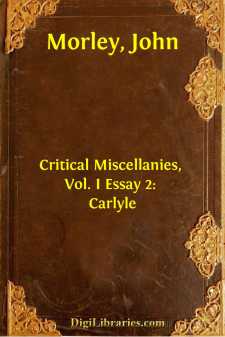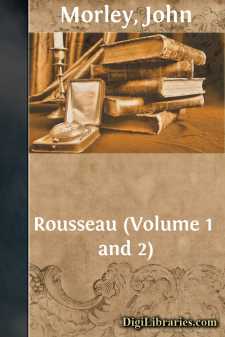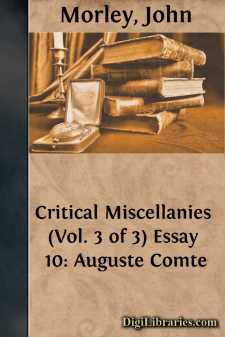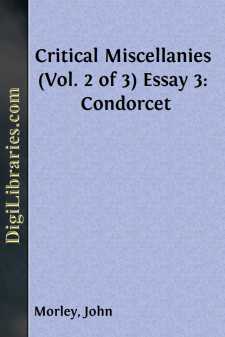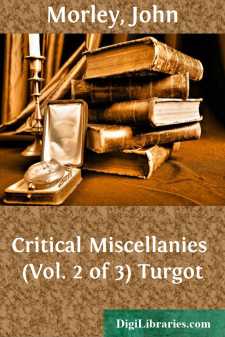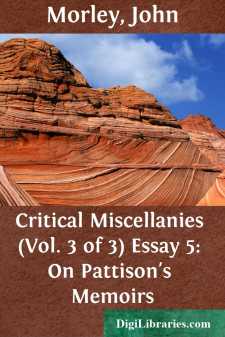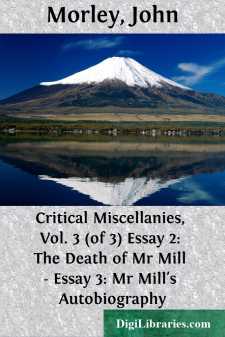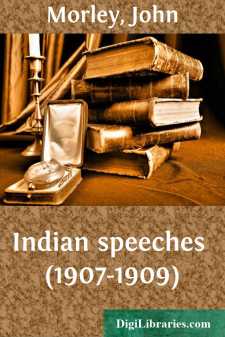Categories
- Antiques & Collectibles 13
- Architecture 36
- Art 48
- Bibles 22
- Biography & Autobiography 813
- Body, Mind & Spirit 142
- Business & Economics 28
- Children's Books 17
- Children's Fiction 14
- Computers 4
- Cooking 94
- Crafts & Hobbies 4
- Drama 346
- Education 46
- Family & Relationships 57
- Fiction 11829
- Games 19
- Gardening 17
- Health & Fitness 34
- History 1377
- House & Home 1
- Humor 147
- Juvenile Fiction 1873
- Juvenile Nonfiction 202
- Language Arts & Disciplines 88
- Law 16
- Literary Collections 686
- Literary Criticism 179
- Mathematics 13
- Medical 41
- Music 40
- Nature 179
- Non-Classifiable 1768
- Performing Arts 7
- Periodicals 1453
- Philosophy 64
- Photography 2
- Poetry 896
- Political Science 203
- Psychology 42
- Reference 154
- Religion 513
- Science 126
- Self-Help 84
- Social Science 81
- Sports & Recreation 34
- Study Aids 3
- Technology & Engineering 59
- Transportation 23
- Travel 463
- True Crime 29
John Morley
John Morley (1838-1923) was a British Liberal statesman, writer, and editor renowned for his contributions to politics and literature. He served as the Chief Secretary for Ireland and Secretary of State for India, advocating for Home Rule and liberal reforms. Morley is also remembered for his biographical works on influential figures like Edmund Burke and Voltaire, reflecting his deep engagement with historical and philosophical subjects.
Author's Books:
Sort by:
by:
John Morley
CARLYLE. The new library edition of Mr. Carlyle's works may be taken for the final presentation of all that the author has to say to his contemporaries, and to possess the settled form in which he wishes his words to go to those of posterity who may prove to have ears for them. The canon is definitely made up. The golden Gospel of Silence is effectively compressed in thirty fine volumes. After all...
more...
by:
John Morley
I am well aware that to try to write Mr. Gladstone's life at all—the life of a man who held an imposing place in many high national transactions, whose character and career may be regarded in such various lights, whose interests were so manifold, and whose years bridged so long a span of time—is a stroke of temerity. To try to write his life to-day, is to push temerity still further. The ashes...
more...
by:
John Morley
CHAPTER I. PRELIMINARY. Christianity is the name for a great variety of changes which took place during the first centuries of our era, in men's ways of thinking and feeling about their spiritual relations to unseen powers, about their moral relations to one another, about the basis and type of social union. So the Revolution is now the accepted name for a set of changes which began faintly to...
more...
by:
John Morley
AUGUSTE COMTE. Comte is now generally admitted to have been the most eminent and important of that interesting group of thinkers whom the overthrow of old institutions in France turned towards social speculation. Vastly superior as he was to men like De Maistre on the one hand, and to men like Saint Simon or Fourier on the other, as well in scientific acquisitions as in mental capacity, still the aim...
more...
by:
John Morley
CONDORCET. Of the illustrious thinkers and writers who for two generations had been actively scattering the seed of revolution in France, only Condorcet survived to behold the first bitter ingathering of the harvest. Those who had sown the wind were no more; he only was left to see the reaping of the whirlwind, and to be swiftly and cruelly swept away by it. Voltaire and Diderot, Rousseau and...
more...
by:
John Morley
I. Anne-Robert-Jacques Turgot was born in Paris on the 10th of May 1727. He died in 1781. His life covered rather more than half a century, extending, if we may put it a little roughly, over the middle fifty years of the eighteenth century. This middle period marks the exact date of the decisive and immediate preparation for the Revolution. At its beginning neither the intellectual nor the social...
more...
by:
John Morley
ON PATTISON'S MEMOIRS. To reckon the subject of this volume among leading minds who have stamped a deep influence on our generation, is not possible even to the friendliest partiality. That was not his position, and nobody could be less likely than he would himself have been to claim it. Pattison started no new problem. His name is associated with no fertile speculation, and with no work of the...
more...
by:
John Morley
THE DEATH OF MR. MILL. (May 1873.) The tragic commonplaces of the grave sound a fuller note as we mourn for one of the greater among the servants of humanity. A strong and pure light is gone out, the radiance of a clear vision and a beneficent purpose. One of those high and most worthy spirits who arise from time to time to stir their generation with new mental impulses in the deeper things, has...
more...
by:
John Morley
I ON PRESENTING THE INDIAN BUDGET (HOUSE OF COMMONS. JUNE 6, 1907) I am afraid I shall have to ask the House for rather a large draft upon its indulgence. The Indian Secretary is like the aloe, that blooms once in 100 years: he only troubles the House with speeches of his own once in twelve months. There are several topics which the House will expect me to say something about, and of these are two or...
more...
by:
John Morley
CHAPTER I EARLY LIFE, AND FIRST WRITINGS It will soon be a hundred and twenty years since Burke first took his seat, in the House of Commons, and it is eighty-five years since his voice ceased to be heard there. Since his death, as during his life, opinion as to the place to which he is entitled among the eminent men of his country has touched every extreme. Tories have extolled him as the saviour of...
more...


